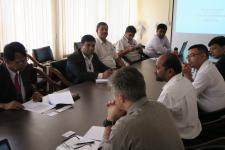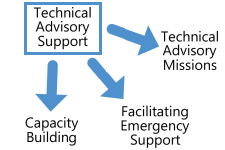UN-SPIDER was established in 2006 after recognizing that disaster risk management and emergency response communities, particularly in developing countries, are not fully utilizing space-based technologies to address the natural hazards they are facing.
Why is that? Those in charge of both disaster risk management or emergency response efforts may not yet recognize the usefulness of space-based information, as reflected in the lack of policies promoting the use of such information. Additionally, practitioners might not be aware of where and how they can access space-derived data. Furthermore, even if disaster managers are aware of the advantages of satellite-technologies and know the existing mechanisms to access such data, they might not necessarily have the capacities to extract the data that could be useful and to apply it to their specific situation. Finally, they might not have the necessary facilities, hardware, or software to access and subsequently process the data.
Recognizing this existing deficit, UN-SPIDER is aiming to bridge the gap with its Technical Advisory Support. The goal is to ensure that all countries recognize the value of all types of space-based information to prevent and mitigate disasters, and use them effectively when challenged with natural hazards and related humanitarian crises. UN-SPIDER provides Technical Advisory Support in various ways:
Advisory Missions
To make sure that all interested stakeholders can benefit from space-based information in the most effective way possible, UN-SPIDER provides Technical Advisory Support to Member States through missions. During these missions, UN-SPIDER meets with key stakeholders in the disaster management community of a country to discuss topic in depth, make recommendations and develop guidelines to improve the use of space-based information for disaster risk management and emergency response. Such missions take place at the invitation of Member States. The three types of Advisory Missions are: Technical Advisory Missions, Institutional Strengthening Missions and Expert Missions.
Emergency Support
Our emergency support targets immediate emergencies and disasters. It supports swift and efficient access to space-based information by ensuring affected countries have access to space-derived information products through international mechanisms such as the International Charter “Space and Major Disasters”, Sentinel Asia and the Copernicus Emergency Management Service (EMS). Upon request, we can activate our network of Regional Support Offices and other partners to make space-based data, services and derived products, such as maps, available to countries affected by a disaster.
Virtual Advisory Support
The UN-SPIDER programme is providing remote technical advisory support to countries upon their demand. This typically consists of webinars, online training and the provision of information products, such as maps, which are created using UN-SPIDER Recommended Practices.
Recommended Practices
Recognizing the need to facilitate the processing satellite imagery to generate specific types of products or maps, UN-SPIDER and its network of Regional Support Offices have elaborated step-by-step procedures or Recommended Practices that describe the steps required to download, pre-process, and process satellite imagery to generate maps than can be used for hazard assessment, for early warning purposes, and for response and recovery efforts. These Recommended Practices have been developed using open software programming languages and tools, and satellite imagery that can be accessed freely.
Training Activities
Training activities are part of our capacity-building efforts and aim at strengthening the capacity of individuals and institutions in using space-based information to prevent, to mitigate, and to react effectively to the challenges posed by natural hazards and emergency situations. They address country needs identified through Technical Advisory Missions and are usually part of an Institutional Strengthening Mission.
Practical Uses
In a complementary fashion to the Recommended Practices, UN-SPIDER and its network of Regional Support Offices have prepared examples of practical uses of the maps elaborated with the Recommended Practices, as well as products and services that have been developed and implemented by the space and geospatial communities to contribute to disaster risk reduction, preparedness, response and recovery efforts.


